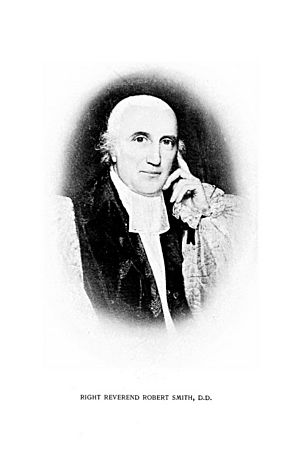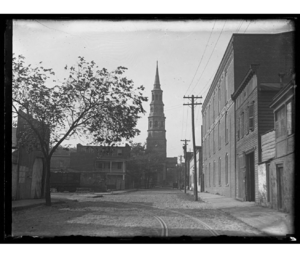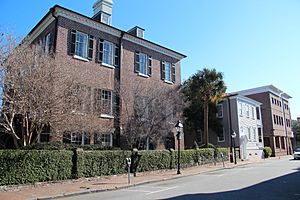Robert Smith (bishop) facts for kids
Quick facts for kids Robert Smith |
|
|---|---|
| Bishop of South Carolina | |
 |
|
| Church | Episcopal Church |
| Diocese | South Carolina |
| Elected | February 10, 1795 |
| In Office | 1795–1801 |
| Successor | Theodore Dehon |
| Orders | |
| Ordination | December 21, 1756 |
| Consecration | September 13, 1795 by William White |
| Personal details | |
| Born | August 25, 1732 Worstead, Norfolk |
| Died | October 28, 1801 (aged 69) Charleston, South Carolina |
| Buried | St. Philip's Church |
| Denomination | Anglican |
| Spouse |
|
Robert Smith (born August 25, 1732 – died October 28, 1801) was an important leader in the Episcopal Church in America. Born in England, he became a clergyman and a planter. He is best known as the first Bishop of South Carolina, serving from 1795 to 1801.
Contents
Early Life and Church Work
Robert Smith was born on August 25, 1732, in Worstead, England. His parents were Stephen Smith and Hannah Press. He went to Norwich Grammar School. Later, he studied at Gonville and Caius College, Cambridge, and earned his Bachelor of Arts degree in 1753. He also received a Doctor of Divinity degree from the University of Pennsylvania in 1789.
Smith became a deacon in the Church of England in March 1756. He was ordained as a priest in December 1756 by Bishop Matthias Mawson. Soon after, he moved to the American colonies. He became an assistant minister at St. Philip's Church in Charleston, South Carolina, in 1757. By 1759, he became the main minister, called the rector, of the same church.
Supporting the American Revolution
Robert Smith was a strong supporter of the American Revolution. When the British took over Charleston in 1780, he had to leave. He moved to Maryland and served as a priest there. In 1783, after the war, he returned to St. Philip's Church in Charleston.
On February 10, 1795, Smith was chosen to be the first Bishop of South Carolina. He was officially made a bishop on September 13, 1795. He was the sixth bishop in the American Episcopal Church's history.
Sermons and Their Impact
Bishop Robert Smith was famous for his sermons. These were speeches given in church, often about important topics of the day. He spoke about the American Colonies and the Revolution.
One famous sermon was on February 17, 1775. This day was set aside for fasting and prayer. Smith spoke to the local government leaders. He talked about the problems between Great Britain and the Colonies. He said that the colonists' desire for self-governance was a "right of man's duty to God." This made his message very powerful for people who believed in God.
Smith's sermons were simple but inspiring. He made people feel that their actions were supported by God. His church members at St. Philip's seemed to agree with his views.
However, Smith also owned many enslaved people. He was a wealthy member of the planter class in South Carolina. In some sermons, he supported the idea of proslavery. Because of his wealth and status, he was seen as one of the elite families in South Carolina.
Smith's speaking style was engaging. He would pause between parts of his sermons to build excitement. He wanted his listeners to feel that God should be at the center of everything they did.
Founding the College of Charleston
Bishop Robert Smith helped start the College of Charleston. In 1785, he and other revolutionary leaders signed the college's official document. A few months later, in February 1786, Robert Smith was chosen as the first president of the college.
The college began teaching classes on July 3, 1785. The very first classes were held in Bishop Robert Smith's home. This house was located at 6 Glebe Street in Charleston. Today, this building is still standing and is where the college's presidents live.
Bishop Smith stopped being president in 1797. He left the college to its second president, Thomas Bee Jr. For many years, the "Bishop Robert Smith Award" was the highest honor a student could receive at the College of Charleston.
Changing a College Award
In October 2020, the College of Charleston decided to stop using Smith's name for its top student award. This decision was made because Smith owned many enslaved people. The college's president, Andrew Hsu, explained that Smith had enslaved over 200 people at the time of his death.
This decision also affected another student group called the "Aiken's Fellows Society." This group was for top-performing students. It is now known as the Charleston Fellows.
 | Valerie Thomas |
 | Frederick McKinley Jones |
 | George Edward Alcorn Jr. |
 | Thomas Mensah |



